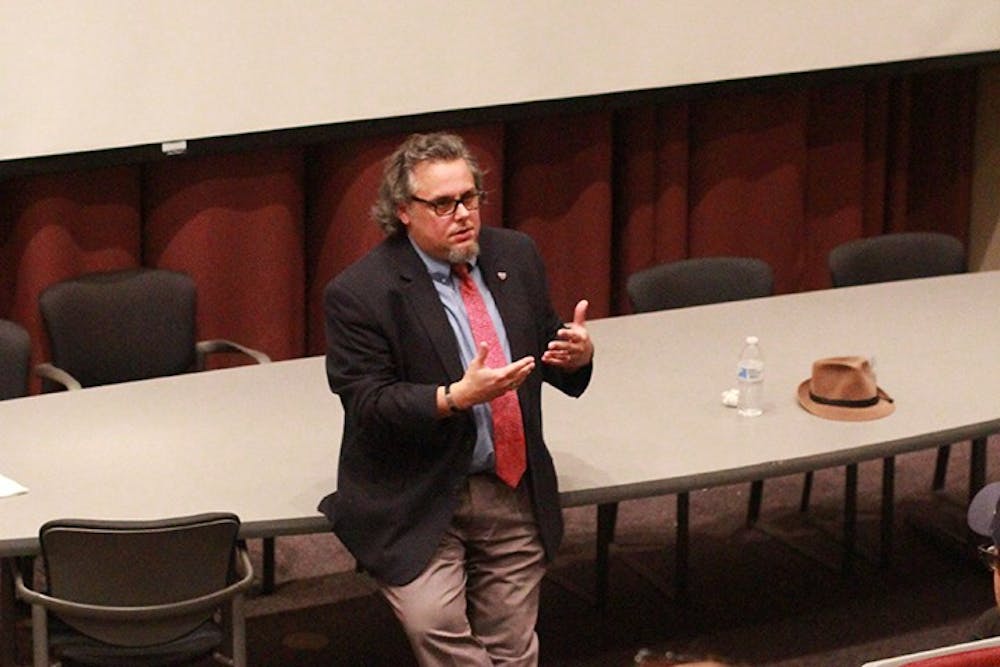“If it wasn’t for that impossibly brave man, doing that impossibly brave thing, I wouldn’t be here today because I never would have been born,” said Steven Lichtman, a Shippensburg University political science professor.
Lichtman has given this lecture several times in the past. On Constitution Day this year, Lichtman started his lecture with a story about his family escaping the Holocaust because of a priest who risked his life to warn them.
One evening in 1938, Lichtman’s European Jewish great-grandfather, Harry Bender, answered his door after being interrupted during dinner with his family. A Catholic priest, who was close with the family, came to tell him, “Mr. Bender, Hitler’s men are coming for you and your family in the morning.”
Already prepared for that moment, the Bender family left that night and did not look back. They continued to walk for at least a month straight.
Lichtman explained that his great-grandfather had a schedule arranged for his family to take two trains which led them to a boat that would take them to America.
During this time, America had powerful people who did not want the European Jews to immigrate, and they tried to get Congress to close the borders. The only way immigrants could get into America is if they knew someone who lived there and could pay $500. Bender had a cousin who lived in the Bronx and was awaiting their arrival.
When Lichtman’s grandfather, Howie Bender — who was 15 when his family left Germany — finally made a living in America, he gathered up a box of goodies and a little money every week and sent it to the priest in Germany who saved his family.
“What does this have to do with Constitution Day?” Lichtman asked those in attendance.
In 2008, Lichtman was going to give his lecture on Constitution Day for the first time. While on his way to the lecture, he turned on the radio and heard something said by the Republican candidate for vice president that year, Sarah Palin.
“America is a Christian nation,” Palin said.
Lichtman said in response to himself, “Well governor, if I’m not Christian does that mean I’m not American, does that mean I’m a second-class citizen?”
This was not the first time Lichtman heard that statement, but it was the time it made him think about how his grandfather’s story is connected to the Constitution.
Ditching the notes he wrote for the lecture that night, he decided to wing it and tell his family’s story. Ever since, he continued to tell his story when he was chosen to lecture about Constitution Day.
“The very first words of the Bill of Rights are the two religion clauses,” Lichtman said. “Congress shall make no law respecting an establishment of religion, or prohibiting the free exercise thereof.”
Lichtman believes this law is inappropriate because the two religion clauses do not work well together. An example of this is the 1972 Supreme Court case of Wisconsin v. Yoder. At the time, Wisconsin’s truancy law said all children must attend school until they were 16.
An Amish family, the Yoders, objected to the law. They said high school starts teaching students material that contradicts their religion, including evolution, sex education, etc.
The Yoders’ conclusion was to make an exception which will allow them to pull their children out of school at the age of 13 because anything they learn in high school will be irrelevant to how they live their lives.
“No matter how they decide that case, one of the two religion clauses gets its corners cut,” Lichtman said.
Eventually, the court ruled in favor of the Yoders.
The Catholic priest who saved Lichtman’s family is German, but Lichtman describes him spiritually as an American.
“Next time you hear the line ‘America is a Christian nation,’ I would like you to think about my grandfather and that impossibly brave man,” Lichtman said.





The Slate welcomes thoughtful discussion on all of our stories, but please keep comments civil and on-topic. Read our full guidelines here.